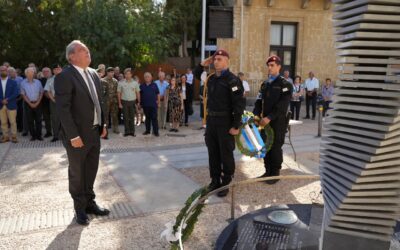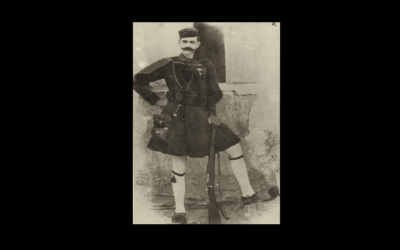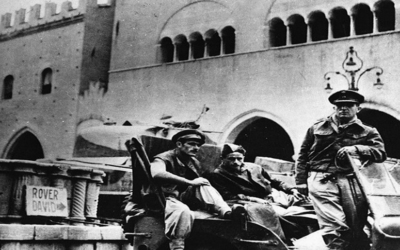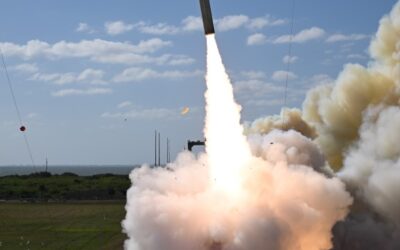HISTORY
HISTORY

There are some milestones in the history of each country, in which the people and the leadership were called to make brave decisions. Decisions between the honour of arms, dignity and patriotism or surrender, submission and humiliation.
Such a decision was made shortly before 03:00 in the early hours of October 28, 1940, by the then Prime Minister of Greece, Ioannis Metaxas who responded with the legendary “Alors, c’est la guerre” (i.e. Well, that means war) to the Italian ambassador to Athens Emanuele Grazi, who conveyed the ultimatum of the Italian claims.
The Italian fascist government of Benito Mussolini demanded the free passage of the Italian army from the Greek-Albanian border in order to occupy some strategic points of Greece (ports, airports, etc.) for supplies and other facilities which would be forwarded to Africa.
Also read: Marinos Mitralexis | The Greek aviator who rammed an Italian aircraft
Grazi himself describes the scene in his memoirs, published in 1945:
“I have an order, Mr. Prime Minister, to make you an announcement and I gave him the document. I watched the emotion in his hands and eyes. In a steady voice and looking at me intently, Metaxas said to me: “This means war”. I replied that this could be avoided. He answered NO. I added that if General Papagos …, Metaxas interrupted me and said: NO! I left bowing with the deepest respect, to this old man, who preferred sacrifice to enslavement.”
Despite the different rhetorical interpretations that were later attributed to the response of Ioannis Metaxas to the Italian Ambassador, at that time, Metaxas had expressed the Greek popular sentiment, the refusal of submission, and this refusal passed to the then Greek press with the word “NO”. It is noted that the word “NO” was presented for the first time as a title in the main article of the newspaper “Hellenic Future” of N. P. Efstratios on October 30, 1940.
Also read: 1st of September 1939 | Germany invades Poland- The beginning of the biggest war in History – VIDEO
At 5 in the morning of the same day, the Greek-Italian War began with the sudden invasion of Italian troops in Epirus, when Greece entered the war in defence.
The “Epic 1940” that followed, and the great victories that the Greek army claimed against the Italians, are difficult or even impossible to describe in a few lines.
The counterattacks and strategic maneuvers of the Hellenic army forced the Italian army, with clear numerical and qualitative superiority, into a deep territorial retreat. By mid-December, Greek forces had advanced into almost a quarter of the territory of Italian-occupied Albania, occupying the cities of Korytsa, Pogradec, Agioi Saranda, Argyrokastro and Chimarra, respectively.
The Italian counterattack, in March 1941, failed gaining only small areas in the area north of Chimarra.
Also read: D-DAY | Landing in Normandy, June 06 1944
The “Epic 1940” was established to be celebrated every year on October 28. Every year on this day in Thessaloniki, in the presence of the President of the Republic and other officials, a large military parade takes place, which coincides with the celebration of the liberation of the city during the First Balkan War.
In Athens and other cities there are also military and student parades, while public and private buildings raise the Greek flag. Military and student parades to celebrate the anniversary are also held in Cyprus.
However, this year, due to special measures to combat the spread of the coronavirus, the Greek government decided to cancel the parades.
For a better understanding of the outcome of the Greek-Italian war, we present you with an informative document, by “Kings and Generals” which accurately explains all the defensive and offensive moves of the Greek and Italian armies, using graphics on a map.
The repulse of the Italian invasion was the first Allied victory against the Axis powers during World War II and raised the morale of the people in enslaved Europe.
Many historians argue that the victory of the Greeks influenced the outcome of the entire war, as it forced the Germans to postpone the attack on the Soviet Union in order to help their Italian allies who lost the war with Greece.
The belated attack in June 1941 involved German forces in the harsh conditions of the Russian winter, resulting in their defeat during the Battle of Moscow.
Also read: June 22, 1941 | Operation Barbarossa, the largest military invasion in history
NEWSLETTER SUBSCRIPTION
Memorial Speech by the Minister of Defence Vassilis Palmas at the annual memorial service for the fallen of the 3rd Company of the 211th Infantry Battalion
The Minister of Defence of the Republic of Cyprus, Mr. Vassilis Palmas, attended the annual commemoration of the fallen of the 3rd…
120 years since the death of Pavlos Melas—The Hero of the Macedonian Struggle—Photos
The Armed Forces honor the memory of the ethnic martyr who gave his life for the liberation of Macedonia…
80 years since the Battle of Rimini – The Brigade that wrote golden pages of history
The “Rimini Brigade” wrote new pages of history for Greece, placing it in the camp of the winners. This success was linked to hope and…
USA | The leader of the Islamic State was killed in an airstrike in Syria
The US military announced midday Friday that it had killed ISIS leader Abu Yusuf in an airstrike in Deir ez-Zor province.
THEON INTERNATIONAL | German parliament approves the exercise of the 3rd option of the OCCAR Night Vision contract
Theon International Plc (THEON) announces that the Defence and Budget Committees of the German Parliament approved yesterday a new…
BATTLEFIELD ReDEFiNED 2024 | The premier Defence and Security Conference Successfully Concludes in Cyprus – Photos
The International Defence and Security Conference “BATTLEFIELD ReDEFiNED 2024” was successfully concluded on Friday, 13, December 2024…
Dark Eagle | Successful Test of Hypersonic Missile by the US Army
The US Army has successfully conducted a test launch of its new hypersonic missile system, “Dark Eagle,” after two years of delays.
GCAP | Industry Partners Reached a Landmark Agreement to Deliver Next-Gen Combat Aircraft
BAE Systems (UK), Leonardo (Italy), and Japan Aircraft Industrial Enhancement Co Ltd (JAIEC) have reached an agreement to form a new…
Completion of the French-Hellenic Defence Innovation Symposium
On 12 and 13 December, 2024, the Hellenic Centre of Defence Innovation (HCDI) organised the first French-Hellenic Defence Innovation…





















0 Comments